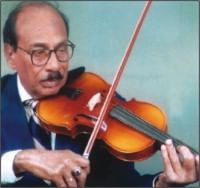<i>Subal Dutta on the deplorable state of radio artistes </i>

Subal Dutta
Everyday as Bangladeshis wake up to the familiar “signature tune” of Radio Bangladesh, Subal Dutta feels as if he has been gifted a new lease of life. “The tune captures the spirit of a free nation and I feel honoured to have been able to compose it after our Liberation war,” says the veteran violinist.
Dutta, known as 'Subalda' to everyone, has been closely associated with the Bangladesh Betar since its inception. As a member of the Radio Staff Committee he worked tirelessly for the welfare of the musicians throughout his career of 45 years. He retired from active service only recently.
“Surprisingly, the musicians are not yet regular government service holders, but are hired on a monthly contractual basis,” he says.
“After they retire, the musicians are deprived of provident fund or pension benefits; instead they are handed a mere month's salary as gratuity. If we have the right to vote why shouldn't we be entitled to a right to live?” says Dutta.
A convenor of Staff Artiste Action Council for the past decade, Dutta is appalled at the gross neglect of the musicians by the administration. Dutta adds, “There has been a steady rise in the entertainment world through the rapid spread of the electronic media, but except for a privileged few, most of the musicians remain in an uncertain and deplorable state of affairs.
“In my humble capacity I have so far promoted 213 casual artistes to regular staffs. This has contributed somewhat to partially improving their living standards, but is miles away from the living standards of musicians in neighbouring countries.”
Dutta took his first steps as a professional violinist with inspiration from his father, Phatik Chandra Dutta, a staff musician/violinist who performed right from the debut broadcast of radio in the undivided Bengal. Later, he trained under Sadek Ali Mia, a renowned clarinet player. During the '70s and '80s radio was the cultural hub, where several renowned musicians such as Ustad Phuljhuri Khan (esraj /taar shanai), Ustad Sadek Ali Mian (clarinet), Ustad Mir Kasem Khan (sitar), Ustad Abed Hossain Khan (sarod/sitar), Dhir Ali Mian (music director), Mobarak Ali( tabla) and Ustad Allah Rakhkha Khan (sarengi) were the heart and soul of the organisation.
Dutta, a Freedom Fighter shares memories of the Liberation War, when he was associated with the Swadhin Bangla Betar Kendra. In one instance, after Liberation, he came to the rescue of a veteran artiste from the hands of an unruly crowd who were disrupting a cultural programme. The pandemonium cost him his favourite Italian violin -- an expensive instrument worth Tk 25000, that was smashed to pieces. But such was the mindset of Dutta that he remembers the incident only as one where he could come to the assistance of a colleague, not one that nearly cost him his livelihood. He was not able to buy an instrument similar to that, having to cope with a less-expensive model.
“In the pre-Liberation times the erstwhile RD (regional director) of Radio, Zillur Rahman, was proactive in calling up headquarters in Rawalpindi for wage increment for the staff, which would be implemented within weeks,” he says with a faint smile. “The current administrative negligence has brought to rot, what would otherwise have been a lucrative, thriving industry,” Dutta adds.
“During the '70s and '80s, as cultural ambassadors, musicians/instrumentalists were privileged to perform abroad. They would be well catered to, and the result of that appreciation was the range of unmatched hit songs,” says Dutta.
In a quick response to a question about improving the prospect of instrumentalists, Dutta says, “Since 'instrumental music' at Bachelors or Masters level is still a far cry and offered at private institutions only with severe limitations, my suggestion would be to introduce a department specialising on the subject at major educational institutions to attract talents and professionally develop the industry.
“Training sessions at Shilpakala Academy at district levels should also be geared up. In addition, many of our colleagues who have retired can be re-instated on contractual basis to train the new generation and provide a much needed impetus to the industry.”

 For all latest news, follow The Daily Star's Google News channel.
For all latest news, follow The Daily Star's Google News channel. 



Comments